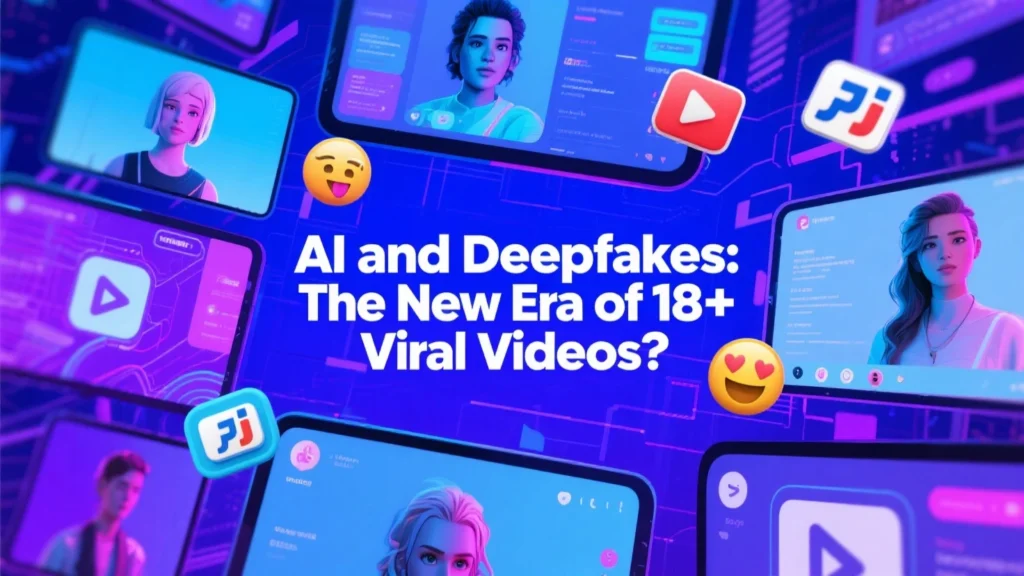AI and Deepfakes: The New Era of 18+ Viral Videos?
Views: 146
AI and Deepfakes: The New Era of 18+ Viral Videos?
In recent years, the rise of artificial intelligence (AI) and deepfake technology has revolutionized digital media creation. While AI offers powerful tools for content generation, it has also sparked controversy—particularly in the adult entertainment and viral video space. One of the most concerning trends is the surge in AI-generated or deepfaked 18+ videos, many of which go viral online with alarming speed.
This new wave of content raises serious questions about ethics, legality, consent, and the future of online media. Let’s explore how deepfakes have changed the game and what this means for internet culture, personal privacy, and digital responsibility.
What Are Deepfakes?
Deepfakes are synthetic media created using deep learning—a branch of AI—to manipulate or generate visual and audio content. By training a neural network on hundreds or thousands of images or videos of a person, AI can convincingly mimic their facial expressions, voice, and gestures. The result: ultra-realistic videos that can make it appear as if someone said or did something they never actually did.
While deepfakes can be used for positive purposes—such as in film production, educational simulations, or even historical documentaries—they are increasingly exploited for unethical reasons, especially in the 18+ or adult video domain.
The Rise of AI-Generated 18+ Viral Videos
The adult entertainment industry has always been at the forefront of adopting new technologies—from VHS and DVDs to streaming and VR. Now, AI is making its mark.
With platforms like DeepSwap, DeepNude (now defunct), and open-source AI tools, it has become alarmingly easy to generate explicit videos of real people—often without their knowledge or consent. These videos are often posted on adult websites, shared on forums, or spread through social media platforms, quickly gaining viral traction due to their shock value.
In some cases, these AI-generated videos feature celebrities, influencers, or even private individuals, fueling a disturbing form of digital impersonation and harassment.
Why Do These Videos Go Viral?
There are several reasons why AI-generated 18+ videos gain rapid attention online:
-
Curiosity and Shock Value: The novelty of deepfake technology combined with explicit content draws immediate interest.
-
Celebrity Involvement: When a well-known person appears (falsely) in an 18+ video, it becomes clickbait material.
-
Anonymity of Sharing: Users can easily share such content without consequences, increasing the speed of distribution.
-
Algorithmic Amplification: Social media algorithms may unknowingly push such videos due to high engagement.
This virality is concerning because it leads to reputational damage, mental health consequences, and even real-world threats for those impersonated.
The Ethical and Legal Nightmare
The production and distribution of AI-generated 18+ content without consent is a clear violation of personal rights. Victims often suffer emotional distress, career damage, and in some cases, legal complications—even though they had no involvement in creating the content.
Some governments and legal systems are catching up. Countries like South Korea, the UK, and several U.S. states have begun enacting deepfake laws that criminalize the unauthorized creation and distribution of synthetic media—especially pornographic content. However, enforcement is difficult, especially when content is hosted anonymously or on servers in unregulated regions.
Ethically, deepfake pornography challenges the boundaries of digital consent. Unlike revenge porn or stolen photos, deepfakes are fabricated—but still incredibly damaging. They create false narratives that can ruin reputations and normalize the violation of privacy.
How Platforms Are Responding
Mainstream platforms such as Twitter (now X), Reddit, YouTube, and TikTok have begun updating their policies to ban synthetic pornographic content. Adult sites like Pornhub have also issued statements and removed known deepfakes from their platforms. However, the battle is far from over.
Some challenges include:
-
Detecting Deepfakes: As technology improves, it becomes harder to distinguish AI-generated videos from real ones.
-
Volume of Content: Thousands of videos are uploaded daily, overwhelming moderation systems.
-
Free Tools: The rise of open-source software allows virtually anyone to become a deepfake creator.
To combat this, tech companies are developing deepfake detection tools and partnering with AI ethicists and legal experts to design better safeguards.
The Role of AI in Fighting AI
Interestingly, AI itself might hold the key to solving this issue. Deepfake detection algorithms are being trained to analyze inconsistencies in facial movements, lighting, and metadata. Tools like Microsoft’s Video Authenticator and Intel’s FakeCatcher can spot manipulated content with a high degree of accuracy.
Researchers are also working on blockchain-based verification systems to authenticate original videos, adding a digital signature that proves content hasn’t been altered. These innovations could create a future where users know which videos are trustworthy and which are artificially generated.
What Can Viewers and Creators Do?
For everyday users and content creators, awareness is the first line of defense. Here are some practical steps:
-
Be Skeptical of Viral Content: If a video seems suspiciously sensational, especially involving public figures, consider the possibility that it may be AI-generated.
-
Protect Your Digital Identity: Limit the amount of personal media shared online. The more photos/videos available, the easier it is to create a deepfake.
-
Report and Support: If you see deepfake porn involving someone you know—or yourself—report it immediately and seek legal advice.
-
Support Ethical AI Use: Advocate for responsible AI development and support platforms that promote content authenticity.
The Future of Adult Content in the AI Era
AI and deepfakes are undeniably reshaping how 18+ content is created and consumed. While some users might see this as an opportunity for creative expression or novelty, the darker consequences cannot be ignored. As we move further into this digital frontier, society must balance freedom of expression with privacy, ethics, and human dignity.
Until legal systems, platforms, and technologies catch up with this rapidly evolving trend, the responsibility lies with users to stay informed, report abuse, and push for responsible innovation.
Conclusion
The intersection of AI and adult content represents one of the most controversial and fast-moving developments in modern internet culture. While deepfakes can be entertaining or even artistic in certain contexts, the exploitation of this technology in 18+ viral videos without consent is a serious concern.
Ultimately, the question isn’t just whether we can make these videos—but whether we should. As AI continues to evolve, so too must our ethics, laws, and digital responsibilities.


